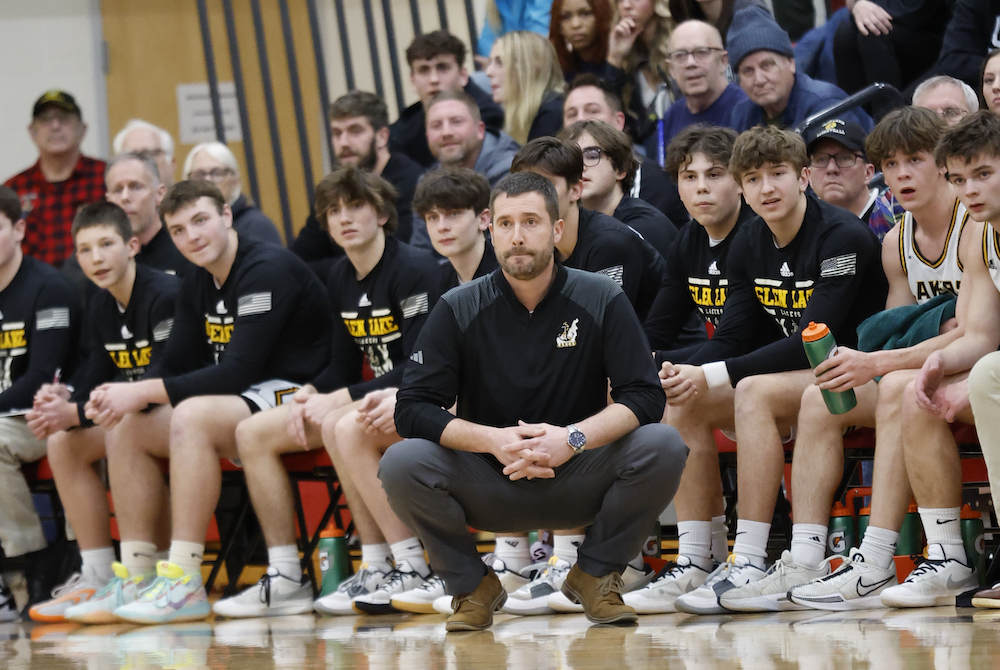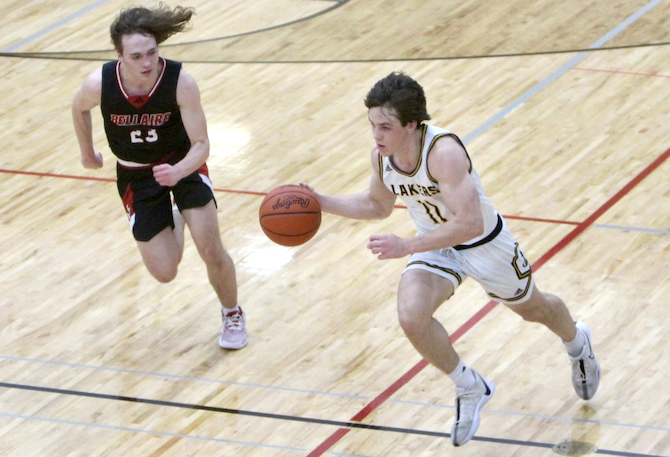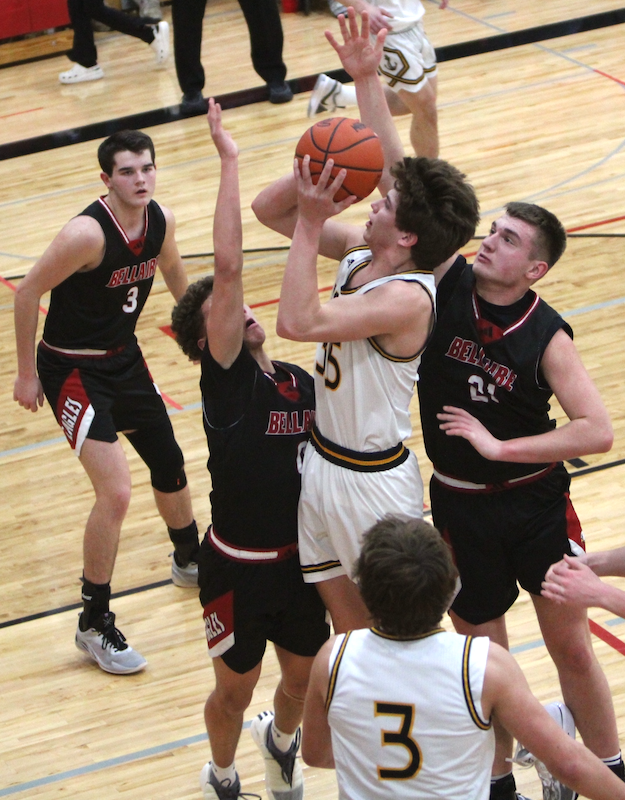
Lessons Passed Down the Coaching Tree
July 18, 2013
By Geoff Kimmerly
Second Half editor
Lessons, like legends, are meant to be passed from generation to generation.
And just as parents hand them down to their children who then do the same, coaches teach athletes the best of what they learned as athletes themselves. Some of those athletes then become coaches as well, and in turn, educate a next group of teenagers growing up in part through their participation in sports.
As we begin to turn our eyes toward another school year beginning next month, here are a few favorite lessons taught by four recent participants of the MHSAA’s Coaches Advancement Program – with back stories on how they learned those lessons themselves and explanations of why passing them on continues to be important.
We are family
Steve Brooks
Ypsilanti boys basketball
Bio: Brooks led the Ypsilanti High School program the last 10 seasons, guiding the Phoenix last winter to its first Regional championship since 1981. He has been selected as the first boys basketball coach for the newly-formed Ypsilanti Community Schools, a merger of the former Ypsilanti and Willow Run districts. Previously, he coached three seasons at Inkster and also led that program to the Quarterfinals.
Lesson learned: Brooks was in fourth grade when he and a friend happened to ride their bike past Flint Northern’s football practice field during one of coach Fred Crawford’s training sessions. The noise and excitement and especially the defensive coaches yelling first caught the kids’ attention; Brooks and his friend ended up watching through the fence until Crawford approached and asked if they’d like a closer look. “He said, ‘Hey, you’re going to be a Viking one day, aren’t ya?’ It was so simple. But it made an impression on me as a young man, the pride and tradition of going there,” Brooks said.
Brooks’ family later moved to a neighborhood in Flint Northwestern’s district. But when the school boundary was redrawn before his junior year – and he had his choice of staying or attending Northern – Brooks remembered saying he would be a Viking one day and made the switch. Building togetherness remains a major focus of Brooks’ Ypsilanti program today, 49 years after Crawford first invited him into Northern’s football family.
Lesson taught: “At any time, our players can come in and talk about personal things and feel like they can let stuff out and it won’t go further than the people it’s entrusted to,” Brooks said. Making a connection to players begins early through his middle school coaches and remains key to building that familial trust.
It’s a philosophy that goes to Brooks’ core. “When you’re starting to coach nephews and younger brothers of players you’ve had, it’s that same type of feeling and promoting of family,” Brooks said.
Do the right thing
Heather Prentice
Portage Northern competitive cheer
Bio: Prentice has coached Portage Northern the last eight seasons and guided the 2007 and 2008 teams to the MHSAA Finals. Total, she’s coached cheer since 1986, including previous tenures at Climax-Scotts and Laingsburg.
Lesson learned: Prentice learned more from what she felt her high school experience lacked. She loved cheering – but decided as a coach to take an active role in the lives of her athletes. “I’ve matured the older I’ve gotten, and I think what’s become more important the older I’ve gotten is putting more of the focus on what I want my kids to leave with,” Prentice said.
“I’m not a parent, and I’m a person in their lives for a very short time,” she added. “But it’s a very significant period in life, and I try to carry myself as I would want them to remember me.”
Lesson taught: To that end, Prentice focuses on mixing plenty of fun with the hard work and lessons she teaches. Integrity ranks high on that list.
She’ll point out during workouts that if an athlete does 23 jumping jacks instead of 25, only that girl will know. But cutting corners, if it continues, tends to catch up with a person.
The payoff is finding out those lessons have paid off.
“The great thing about coaching for so long is you get letters or emails back from kids; ‘I thought of you today when I was disciplining my 3-year-old child,’ things like that. Or, ‘I went in for a job interview and they asked for one of my qualities. And I said I have integrity. I do have integrity, and you taught me that.’ Those are the cool moments,” Prentice said. “They really did hear me; they did hear what I am saying.
Accept responsibility
Duane Enderle
Birch Run girls and boys soccer
Bio: Enderle has coached Birch Run’s girls program since its start, and this spring led the Panthers girls to the District Final for the second time during the program’s six-season history. He also coached the boys for four seasons before taking the last two off, but will return to their sideline this fall.
Lesson learned: Enderle was a sophomore starter on his South Hagerstown, Md., team during one of the first seasons under eventual longtime coach Mike Tesla. At one point that season, Enderle didn’t make a Saturday practice – and during the next Monday’s game never left the bench.
“I learned at an early age it doesn’t matter how good you are. There’s always a consequence,” Enderle said.
Lesson taught: He’s noticed the last few seasons, both on the high school and club soccer fields, a growing number of players unable to control their emotions. “They get yellow cards and come out of a game for 10 minutes, and if it’s one of the good players it ends up hurting the team,” Enderle said.
He said this year’s Birch Run team saw a different side of him as he pushed accountability a little bit harder. It’s a lesson that doesn’t lose significance, even as athletes change over the years and push boundaries in different ways.
“That’s the biggest thing I try to pass on to them, their own self-responsibility and accounting for all of their actions,” Enderle said. “Everything they do always has consequences.”
One for all
Kim Crum
Mattawan girls lacrosse
Bio: Crum is a 2002 Mattawan graduate and played three seasons for the highly-successful softball program led by coach Alicia Smith. Crum just finished her third season coaching the school’s girls lacrosse team after previously coaching the Kalamazoo United team for three seasons.
Lesson learned: Being part of a team is a full commitment to those teammates, something Crum works to instill in her players each spring. She learned that in part as an athlete under Smith – who last season led Mattawan to its second MHSAA championship in three seasons. “With a group of teenage girls, a group of any teenagers for that matter, they form cliques and opinions of people before they get (on a team),” Crum said. “When we were on that team, there were people that didn’t agree, didn’t get along. But when we set foot in practice, for a game, we were part of a team and it didn’t matter what happened outside of there during the day. I try to tell the kids that now.”
Lesson taught: Instead of finishing practices with “1-2-3-Wildcats,” the team’s mascot, Mattawan closes with “1-2-3-Family!” Crum’s emphasis on “team commitment” also has grown through working with her assistant Matt Stephens, the school’s football coach during the fall.
Playing a high school sport often means seeing those coaches and teammates as much or more than family during that three or fourth-month span. Some of Crum’s lacrosse players have played together in the past or together on other sports teams. But she and Stephens are quick to remind them that each team, each season, is a new group with new dynamics to learn.
“Every time we do something, we look at it as how it affects the group,” Crum said. “We have to figure out how each other work. ... Be patient. By the end, we’ll figure things out.”
PHOTO: Ypsilanti boys basketball coach Steve Brooks (far right) celebrates with his team this March after leading the Phoenix to its first Regional title since 1981. (Photo courtesy of Randy Castro, Ann Arbor Journal.)

After Leading Glen Lake Girls to Title, Bradford Brings Boys Into Final Week
By
Tom Spencer
Special for MHSAA.com
March 15, 2024
Eight is Enough.
 Or is it?
Or is it?
For Jason Bradford growing up on the farm of Arden and Lynn Bradford as one of their eight children, it probably was enough. Bradford’s upbringing may have been slightly similar to “Eight Is Enough,” a comedy-drama television series about a family with eight children that aired on ABC from March of 1977 to May of 1981.
But the show didn’t depict pick-up basketball being played in the barn like it was for Bradford and his siblings. And surely eight would not be enough Regional basketball championships for Jason Bradford, nor enough District titles either.
After leading Maple City Glen Lake to the Division 4 girls basketball championship last year, Bradford stepped down from coaching. At the time his teams had won five Regional and six District titles.
Now his teams have won six Regional and seven District championships. He took over Glen Lake’s boys program during the holiday break this winter as the Lakers were off to a 4-2 start. They finished the season 22-5.
It was the Lakers boys’ first 20-win campaign since the 2018-19 season, and they clinched their first Regional title since 2018.
Glen Lake went 19-5 last year losing to Traverse City St. Francis in the District Final. The season before that ended with a first-round loss to Elk Rapids and 15-6 record.
Bradford led his girls teams four times to the MHSAA Semifinals and almost got their a fifth time this year with the boys. Their run ended Tuesday with a tough loss in the Division 4 Quarterfinals to Mount Pleasant Sacred Heart, 63-51.
“We’re licking the wounds of that one,” he said. “We’ve got to remember to look at the big picture – they are young men becoming men.”
 But Bradford already has turned his thoughts to next season and is making plans for summer basketball.
But Bradford already has turned his thoughts to next season and is making plans for summer basketball.
“Having the summer with them if it goes the way we want is going to be huge,” Bradford said. “There are a few things going through my head I can change or adjust.
“We want to continue to build on what our philosophy of what Glen Lake is and my philosophy of what Glen Lake is.”
The Lakers will graduate Cooper Bufalini, Gage Baker, Dylan Cundiff, Tyler Bixby and Jamie Blondia. But they’ll have their top two scorers back, sophomore Jacob Plamondon and junior Benji Allen. Plamondon kicked in almost 20 points per game and led the team in rebounding with more than 10 per contest. Allen averaged more than 11 points per game and led the team in assists.
Glen Lake finished second in the Northwest Conference behind Benzie Central, which was undefeated in league play. The Lakers knocked off league opponents Frankfort in the Division 4 District title match and Buckley in the Regional Semifinal.
The battles with Benzie for the conference title may have been the highlights of the season, Bradford noted. Those were Glen Lake’s only losses in league play, and a share of the title was within their grasp late in the second game with the Huskies.
The Lakers lost 60-51 on their home court in the first meeting but took Benzie to the limit in the rematch before falling, 41-39, on the road.
“We had a lot of great games and a lot of great memories,” Bradford said. “Going for conference it pretty much came down to the last few seconds with lead changes.
“We were up by one point with less than 30 second lefts, and that was the high point,” he continued. “We came up short, but we learned from that game.”
Also among highlights for Bradford this year was the chance to coach against his brother Nathan for the first time in their careers.
 The Bradfords started coaching girls varsity basketball 16 years ago, but their teams were in different conferences at the time. Nathan coached the Onekama girls but moved to the boys program before Onekama and Glen Lake had a chance to compete against each other in the Northwest Conference.
The Bradfords started coaching girls varsity basketball 16 years ago, but their teams were in different conferences at the time. Nathan coached the Onekama girls but moved to the boys program before Onekama and Glen Lake had a chance to compete against each other in the Northwest Conference.
The Bradford coaches often talk after their games and learn from one another. They have also seen their parents frequently in the bleachers as they rotate home game sites to see their grandchildren play and their sons coach.
When Onekama and Glen Lake played this year, eight Bradfords were on the rosters as players or coaches. Jason’s son Toby, a freshman, played on the Glen Lake junior varsity team, as Nathan’s son Carson played for the Portagers’ JV squad. The Onekama JV team is coached by another Bradford, Jason and Nathan’s brother Nick. And there were three more Bradfords on the varsity – Nathan’s son Caden and his cousins Luke and Arden.
Glen Lake won both varsity games, 38-36 at Onekama and 61-33 at home.
Jason and his wife Jackie have five children. Their youngest son, Drew, is now a sixth grader at Glen Lake. His oldest son, J.J., is at Michigan Tech and has begun officiating basketball after his senior season at Glen Lake cut short by the pandemic while the Lakers were preparing to play in a 2020 District Final. Daughters Maddie and Grace are playing basketball for Lake Superior State University.
Maddie and Grace were big parts of Glen Lake’s deep postseason runs with Jason as girls coach. With many games played on Saturdays and not conflicting with coaching, Jason, Jackie and the younger boys were able to travel to see the Upper Peninsula’s Lakers play regularly.
This season, the Glen Lake girls – under first-year head coach Brad Fosmore – went 16-8 and won Northwest Conference and District titles before losing a nail-biter, 45-42, to league rival Frankfort in the Regional Semifinal.
“Jason did a good job, and it felt good to carry on the tradition,” said Fosmore, who previously served as a Lakers JV coach. “We took it one game at a time.
“Jason worked hard to build a great girls program,” he continued. “It made it pretty simple because they had that winning tradition and kind of kept it rolling.”
 Tom Spencer is a longtime MHSAA-registered basketball and soccer official, and former softball and baseball official, and he also has coached in the northern Lower Peninsula area. He previously has written for the Saginaw News, Bay County Sports Page and Midland Daily News. He can be reached at [email protected] with story ideas for Manistee, Wexford, Missaukee, Roscommon, Ogemaw, Iosco, Alcona, Oscoda, Crawford, Kalkaska, Grand Traverse, Benzie, Leelanau, Antrim, Otsego, Montmorency, Alpena, Presque Isle, Cheboygan, Charlevoix and Emmet counties.
Tom Spencer is a longtime MHSAA-registered basketball and soccer official, and former softball and baseball official, and he also has coached in the northern Lower Peninsula area. He previously has written for the Saginaw News, Bay County Sports Page and Midland Daily News. He can be reached at [email protected] with story ideas for Manistee, Wexford, Missaukee, Roscommon, Ogemaw, Iosco, Alcona, Oscoda, Crawford, Kalkaska, Grand Traverse, Benzie, Leelanau, Antrim, Otsego, Montmorency, Alpena, Presque Isle, Cheboygan, Charlevoix and Emmet counties.
PHOTOS (Top) Jason Bradford, kneeling, coaches the Maple City Glen Lake boys varsity after taking over the program earlier this season. (Middle) Glen Lake’s Cooper Bufalini (11) pushes the ball upcourt during a 65-49 District Final win over Bellaire. (Below) The Lakers’ Jacob Plamondon (35) makes a strong move to the basket. (Top photo by RD Sports Photo/Rob DeForge, additional photos by Nicole Bixby.)

